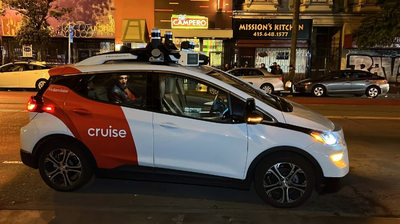
General Motors's autonomous vehicle unit, Cruise, is recalling nearly 1,000 of its driverless cars following a pedestrian crash in San Francisco last month.
Cruise announced Wednesday it recalled 950 of its cars to update their software after one of the vehicles hit a pedestrian, who was dragged to the side of a road in San Francisco on Oct. 2.
In the Oct. 2 crash, a driver-operated car next to a Cruise vehicle collided with a pedestrian, pushing the person across the vehicle and onto the ground in the path of the Cruise car, the company said in documents filed with the U.S. National Highway Traffic Safety Administration (NHTSA).
Cruise's software incorrectly categorized the crash, causing the car to try to pull over out of traffic instead of staying stationary, according to the filings.
The safety recall report from the NHTSA said Cruise's driverless software can cause its cars to make this error, which it said played a large role in the Oct. 2 crash.
The General Motors-owned tech firm said Wednesday that it issued the recall although it determined that a "similar collision with a risk of serious injury" could occur again every 10 million to 100 million miles without the software update.
"We strive to continually improve and to make these events even rarer. As our software improves, it is likely we will file additional recalls to inform both NHTSA and the public of updates to enhance safety across our fleet," the company wrote.
Cruise said it is also testing a remedy software update on a supervised fleet and will hire a chief safety officer following the incidents.
The recall comes after a series of other collisions that have prompted safety concerns around Cruise's robotaxis.
Last month, California rescinded Cruise's driverless permits in San Francisco, saying the company's cars are "not safe for the public's operation" and that Cruise "misrepresented" safety information.
The Department of Motor Vehicles (DMV) in California gave Cruise a list of changes required to get its autonomous vehicle permissions back, but did not expand on details.
The DMV and others also accused Cruise of not initially sharing all video footage of the crash, though the tech firm claims it disclosed the full video to state and federal officials, according to The Associated Press.
Cruise started testing its autonomous cars on San Francisco roads in August and later agreed to cut half its fleet in late August following two collisions with vehicles.
Cruise operates around 600 autonomous cars in a few cities across the nation. It began its commercial taxi service in 2022 with driver-operated cars equipped with autonomous scanners, but it started the fully-autonomous program earlier this year.
The company is still allowed to test its vehicles on California roads with drivers inside.